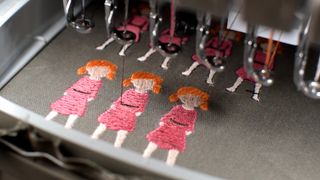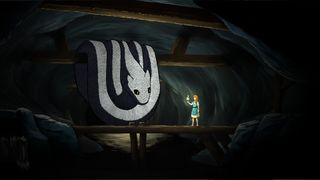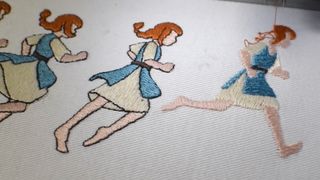Viral Ghibli-style game with embroidered animations that take "three times as long" ignites discussion over the labor and value of art
Scarlet Deer Inn looks so hard to make it's borderline unbelievable
Hi, I'm making a game where all characters have embroidered animation. pic.twitter.com/nMgNOsCNKcApril 29, 2023
A few days ago, developer Eva Navratilova of two-person studio Attu Games posted an 11-second clip to Twitter with a simple caption: "Hi, I'm making a game where all characters have embroidered animation." The game in question is Scarlet Deer Inn, which will be the third release from Attu Games after Feudal Alloy and Toby: The Secret Mine, and that clip has since racked up nearly 24 million views.
The clip's virality prompted a lot of the same questions. Why would you do this when animating and game development are already demanding, time-intensive processes even without the unorthodox addition of embroidery? Why embroidery specifically? How does this actually work in terms of converting stitched art to digital models? Are the developers okay?
I was quite struck by the game myself, and Feudal Alloy is still kicking around my memory banks after five years, so I reached out to Navratilova to find out how this embroidered game is made. My first question was the obvious one: why?
"Because we thought it was cool," Navratilova explains. "We simply wanted to give it a shot because we really enjoy various crafts and handmade stuff. A few people are using embroidery to create some amazing animation, but no one has yet made a real game with it. It's also exciting and fun. Even though there is a ton of 'unnecessary' extra labor involved, it is amazing to work on something new and creative."
"There is no connection between the embroidery and the story itself," she explains. "We believe that it would change the feeling we want the game to have. We're trying to achieve the feel of the Studio Ghibli movies, not something like Paper Mario, Yoshi's Crafted World, or Kirby's Epic Yarn games."

I also asked if the game's sudden social media virality has had any lasting impact, but Navratilova says, "despite widespread media coverage and reaching the mainstream, it didn’t help us that much. Our game is targeted at a small group of gamers who enjoy weird, artsy indie games, and the wishlists reflect that."
Scarlet Deer Inn, per its Steam page, tells "the story of Elise. A mother of two. She's not particularly special, there are no heroic epics written about her." It's inspired by Slavic folklore, uses hand-painted backgrounds, and features music performed on traditional instruments. Attu Games wanted to give it a little extra something, and Navratilova says they'd also "wanted to use embroidery for a game for about nine years" already, and the resulting handmade feel ended up being a good fit here. But they didn't start with the embroidered style they ended up with.
Sign up to the 12DOVE Newsletter
Weekly digests, tales from the communities you love, and more
"We've changed the game graphics more than once overall. It was originally a different style. The more we learned, the more we realized we could make it better. We started by redoing the backgrounds in the Ghibli style. We love their movies and are surprised that there are very few games that look like that. We decided to finally add the embroidery about a year ago."
Turning embroidery into a video game

Navratilova says they use one, six-needle machine for the embroidery because "that means we can prepare exactly that many colors there" and "while the machine is embroidering, I'm doing other things." Even so, it's not a quick process. Navratilova first tried embroidery as a teen and also dabbles in knitting or crocheting, so she's got the process pretty well optimized by now. But still, "it takes us, let's say, three times as long to do such an animation as it would take when we used a normal digital frame-by-frame animation workflow," she estimates.
"When the embroidery is done, I scan the fabric onto the computer," Navratilova begins, walking me through the method they use to turn physical embroidery into digital art. "Originally, we tried to take pictures in the photo box, but it didn't turn out well and it was more complicated. I have a scanner next to me on my desk. Then I cut out each frame in Photoshop and remove the cloth around it. Then I add an outline and shadow. We used to embroider the outline too. But the machine couldn't do it nicely. It needed a double outline to hide the mistakes, and it was too thick. We embroider the characters quite small, and it seems it can't be done that way. The final overall look of the game is still the most important thing for us."

The amount of embroidered frames needed "really depends on the complexity of the character animation," she adds. Side characters have dozens while Elise has hundreds. "The embroidery must first be prepared on a PC. It means I take the finished frame-by-frame animation and basically redo it into vectors in embroidery software and decide a lot of different settings for threads, colors, stitch styles, angles, etc. The entire machine embroidery process is quite challenging. A lot also depends on the fabric being embroidered. There is a big difference between fine fabric and denim, for example. The preparation takes hours, but then it only takes a few minutes to embroider one frame."
I'd say "a ton of 'unnecessary' labor" is selling it short, but the result is an undeniably fascinating intersection of physical and digital art. As I understand it, there's an almost pixel art-like logic underpinning the embroidery prep, except you're now drawing a character stitch by stitch, but Scarlet Deer Inn achieves a different and truly novel texture and overall aesthetic by really committing to the bit. I can't wait to see how it looks in motion once the game's eventually out, no doubt countless stitches later.
At the far end of the visual spectrum, my eyeballs can barely process the hottest new roguelike on Steam.

Austin has been a game journalist for 12 years, having freelanced for the likes of PC Gamer, Eurogamer, IGN, Sports Illustrated, and more while finishing his journalism degree. He's been with 12DOVE since 2019. They've yet to realize his position is a cover for his career-spanning Destiny column, and he's kept the ruse going with a lot of news and the occasional feature, all while playing as many roguelikes as possible.
Most Popular
